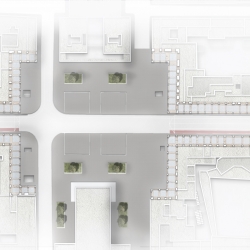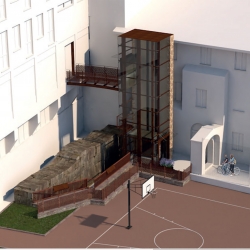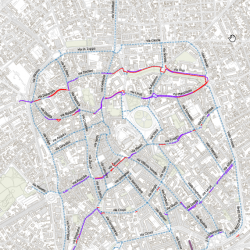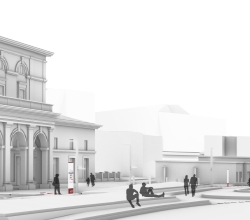
Urban restoration of Via Grande
The main motivations inherent in adhering to the experimentation are to promote and experiment the ethical-design approach of urban accessibility at the different project scales (from urban planning, to urban design, to the design of individual public spaces) in order to progressively affirm the culture of urban inclusiveness both within the municipal structure (in its political and technical components), and in the city community that will be involved, with diversified modalities of active listening/participation, in the different project paths. The promotion of urban accessibility is linked to the integrated policies concerning the contextual elaboration of the Operational Plan, the…

The welcoming, accessible and attractive city
The Municipality of Spello has been participating in the debate on cities accessible to all promoted by the INU for a few years now, convinced of the need to “network”, also in terms of knowledge and exchange of experiences in order to be able to promote and implement increasingly effective urban policies for the accessibility and attractiveness of our cities.
From the Strategic Framework for the Enhancement of the Historic Centre came the projects for accessibility, attractiveness and hospitality with the aim of increasing the degree of liveability through the completion of the alternative mobility system and the improvement of…

PEBA for living
The elaboration of the PEBA favours the improvement and greater quality of urban planning, intervention programming and design solutions adopted to make the city accessible.
Environmental accessibility is the requirement for the launch of inclusive strategies to inhabit a city that is fair and accessible to all. The intervention provides basic elements to support the strategic choices of the PEBA aimed at guaranteeing, along some of the main routes, the accessibility of routes to reach essential services, places and public buildings of greater attractiveness for all citizens.
The plan is interdisciplinary, participatory, dynamic, efficient and organic and aims at the regeneration…
ACCESSIBILITY AND INCLUSION FOR ALL. Award ceremony for the 2022 competition
Alessandro Bruni and Iginio Rossi, INU – URBIT
INU’s Project “Accessible Cities for All” has highlighted the importance of building the accessibility system where the purpose goes beyond the logic of single interventions overcoming barriers while towards a broader goal of overall quality. This approach is often reaffirmed within the Guidelines published at http://atlantecittaccessibili.inu.it/.
The wider concept of accessibility and inclusion for all involves the limitations imposed on people’s autonomy produced by physical, sensory, perceptual, intellectual, gender, but also considers cultural, social, economic, and environmental barriers. Among these the central themes of the 2022 call for proposals have prioritized: people’s well-being; urban…
A DEAL FOR URBANISM CITIES ACCESSIBLE TO ALL
Alessandro Bruni, Iginio Rossi, INU – URBIT
In 2021 INU first experimented with the deal for urbanism “Accessible Cities for All”. The pact must not be understood as a mere negotiation nor even as a technical exercise, but as an inescapable commitment, a political and cultural choice capable of acting positively on: the environment, society, and economy; settlement dispersions, policies, and institutions; inclusion, quality of life, fragile conditions and shattering of coexistence; relational dispersion; sectoriality and distinctness of knowledge.
Albeit fragmented, all these areas/aspects concern all-around accessibility and the networks that constitute its broader articulation. Moreover, since 2016, INU’s Project…
ACCESSIBILITY
Curated by
Paolo Galuzzi, Director of URBANISTICA
Iginio Rossi, Coordinator “Città accessibili a tutti”, INU
Accessibility for all is a complex area that, since it refers to fundamental values of humanity, affects the quality of people’s lives and, inevitably, the quality of places; it is a constitutional right-duty, described in Article Three of the Constitution, and a universal one, treated in Law 18 of 2009, adopting the UN Convention on the Rights of Persons with Disabilities of 2006. It turns out to be very akin to the concept of freedom by allowing levels of mobility, relational choices, urban enjoyment, and life…
